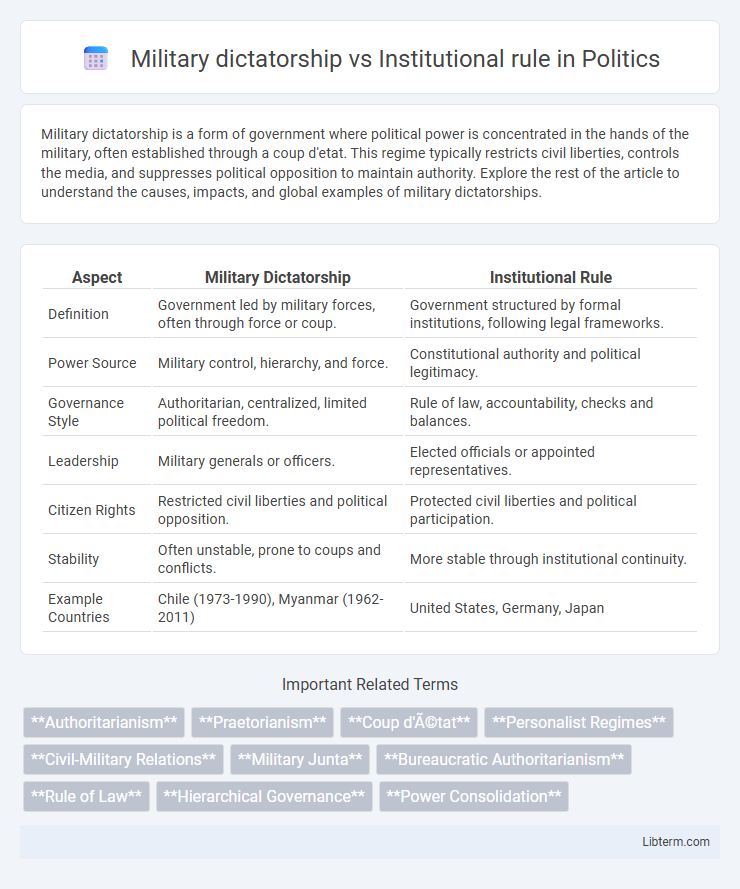Military dictatorship is a form of government where political power is concentrated in the hands of the military, often established through a coup d'etat. This regime typically restricts civil liberties, controls the media, and suppresses political opposition to maintain authority. Explore the rest of the article to understand the causes, impacts, and global examples of military dictatorships.
Table of Comparison
| Aspect | Military Dictatorship | Institutional Rule |
|---|---|---|
| Definition | Government led by military forces, often through force or coup. | Government structured by formal institutions, following legal frameworks. |
| Power Source | Military control, hierarchy, and force. | Constitutional authority and political legitimacy. |
| Governance Style | Authoritarian, centralized, limited political freedom. | Rule of law, accountability, checks and balances. |
| Leadership | Military generals or officers. | Elected officials or appointed representatives. |
| Citizen Rights | Restricted civil liberties and political opposition. | Protected civil liberties and political participation. |
| Stability | Often unstable, prone to coups and conflicts. | More stable through institutional continuity. |
| Example Countries | Chile (1973-1990), Myanmar (1962-2011) | United States, Germany, Japan |
Defining Military Dictatorship
Military dictatorship is a form of authoritarian government where political power resides with the armed forces, often established through a coup d'etat. This regime bypasses democratic institutions, concentrating authority in military leaders who control political decisions and suppress opposition. It contrasts with institutional rule, which relies on established legal frameworks and civilian governance to maintain political order.
Understanding Institutional Rule
Institutional rule emphasizes governance through established laws, norms, and formal institutions that promote stability, accountability, and continuity in political processes. Unlike military dictatorship, which relies on centralized control and often suspends constitutional frameworks, institutional rule ensures power is distributed across various branches and adheres to legal procedures. This system fosters transparency, protects civil liberties, and supports democratic principles by embedding authority within formal structures rather than individual leadership.
Historical Contexts: Military vs Institutional Governance
Military dictatorship often emerges through coups d'etat, where armed forces seize control, disrupting civilian institutions and imposing centralized power usually marked by authoritarianism and suspension of democratic processes. Institutional rule, in contrast, is characterized by governance through established frameworks like constitutions, legal systems, and elected bodies that maintain continuity, legitimacy, and adherence to rule of law. Historical contexts show military regimes frequently arise in times of political instability or crises, whereas institutional governance reflects long-term development of state structures promoting stability and accountability.
Power Structures and Decision-Making Mechanisms
Military dictatorship centralizes power in the hands of a single military leader or junta, often bypassing formal institutions and concentrating decision-making authority within the armed forces. Institutional rule distributes power across various branches of government or established bodies, ensuring decisions are made through legal frameworks, checks and balances, and bureaucratic processes. This separation of powers in institutional systems aims to prevent authoritarian control and promotes accountability, whereas military dictatorships rely on hierarchical command and unilateral directives.
Civil Liberties Under Military Dictatorship
Civil liberties under military dictatorship are severely restricted, with frequent suspension of freedoms such as speech, assembly, and press. Military regimes often impose curfews, censorship, and political repression to maintain control, undermining democratic institutions and human rights. Institutional rule, by contrast, typically upholds legal frameworks that protect civil liberties and ensure accountability of governing bodies.
Rule of Law and Institutional Stability
Military dictatorships often undermine the rule of law by concentrating power in the hands of a few, leading to arbitrary decision-making and weak judicial independence. Institutional rule, by contrast, promotes institutional stability through adherence to established legal frameworks, checks and balances, and transparent governance. Stable institutions uphold the rule of law by ensuring accountability, protecting rights, and enabling continuity in policy enforcement.
Impact on Economic Development
Military dictatorship often leads to economic instability due to abrupt policy changes, reduced investor confidence, and prioritization of defense spending over social programs, which can stifle sustainable development. Institutional rule, characterized by consistent legal frameworks and accountable governance, fosters economic growth by creating a stable environment for investment, innovation, and efficient resource allocation. Countries under institutional rule typically experience higher GDP growth rates, improved infrastructure, and greater foreign direct investment compared to those under military regimes.
Political Participation and Representation
Military dictatorships often suppress political participation by dissolving legislative bodies and banning political parties, concentrating power within the military hierarchy. Institutional rule promotes political representation through established democratic frameworks, enabling citizen involvement in decision-making via elections and representative institutions. The difference significantly impacts governance legitimacy and citizen empowerment, with institutional rule fostering broader political inclusion.
International Relations and Legitimacy
Military dictatorships often face challenges in gaining international legitimacy due to their reliance on force and suspension of democratic norms, which can result in diplomatic isolation and sanctions. Institutional rule, characterized by adherence to established legal frameworks and democratic principles, tends to foster stronger international recognition and cooperation by promoting stability and predictability in foreign relations. Legitimacy in international relations is frequently contingent on a government's perceived commitment to governance norms, making institutional rule more favorable in sustaining long-term diplomatic engagement.
Transition Paths: From Military to Institutional Rule
Transitioning from military dictatorship to institutional rule often involves negotiated power transfers, constitutional reforms, and the establishment of civilian-led governance frameworks. Successful transitions prioritize restoring democratic institutions, reinforcing the rule of law, and ensuring security sector reforms to prevent military interference in politics. Historical examples like Chile's 1990 handover or Spain's post-Franco era highlight the importance of phased demilitarization and inclusive political dialogue in achieving sustainable institutional rule.
Military dictatorship Infographic

 libterm.com
libterm.com